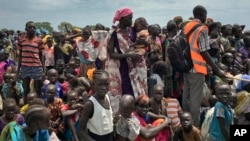The ongoing conflict in South Sudan is pushing millions more people in the country closer to famine, says a new report by the United Nations.
This year, food insecurity in South Sudan could affect more than seven million people — some 60 percent of the country's population — if they do not receive sustained assistance, says the United Nations.
A joint report by three U.N. agencies says that currently, almost half of the population has been at a "crisis" level of food insecurity since January.
Serge Tissot, the Food and Agriculture Organization representative for South Sudan, said the worsening situation is mostly due to the expanding conflict.
"Even with the humanitarian support, we have still 1.9 million people who are very close from famine," said Tissot.
Parts of South Sudan were declared famine areas in early 2017. The U.N. warns that famine-like conditions could return during the lean season, May to July, unless assistance and access are maintained.
To prepare, the U.N. World Food Program is pre-positioning food in areas likely to be cut off during the rainy season beginning in April. It plans to pre-position twenty percent more food supplies than last year — some 140,000 metric tons — in more than 50 locations.
South Sudan's civil war broke out in December 2013 and has since forced two million people to flee the country. Another two million are internally displaced, and most are unable to grow their own food.
Crystal Wells is the regional spokeswoman for the International Committee of the Red Cross (ICRC) based in Nairobi. She said aid agencies are constantly responding to emergencies, providing food aid to the displaced and medical care to war wounded.
"It's one of our largest responses in the world and that's because the needs are just so great.So, it's very important that the international community continues to provide support to humanitarian organizations such as the ICRC because it's literally a difference often between life and death," said Wells.
The U.N.'s Tissot says he's confident international aid will prevent famine from re-emerging in South Sudan. But he notes food aid to the country - some $1.7 billion a year - is unsustainable.
"The solution is not only through the distribution of food.The first solution should be through a peace agreement and the rehabilitation of the agricultural sector in South Sudan," said Tissot.
With the conflict now entering a fifth year, that kind of solution is nowhere in sight.
UN Warns Famine Conditions Set to Return in South Sudan

NAIROBI, KENYA —






